District of Columbia
Plea deal for D.C. man charged with attack on gay Asian man, parents
U.S. Attorney offers to drop two of three hate crime designations
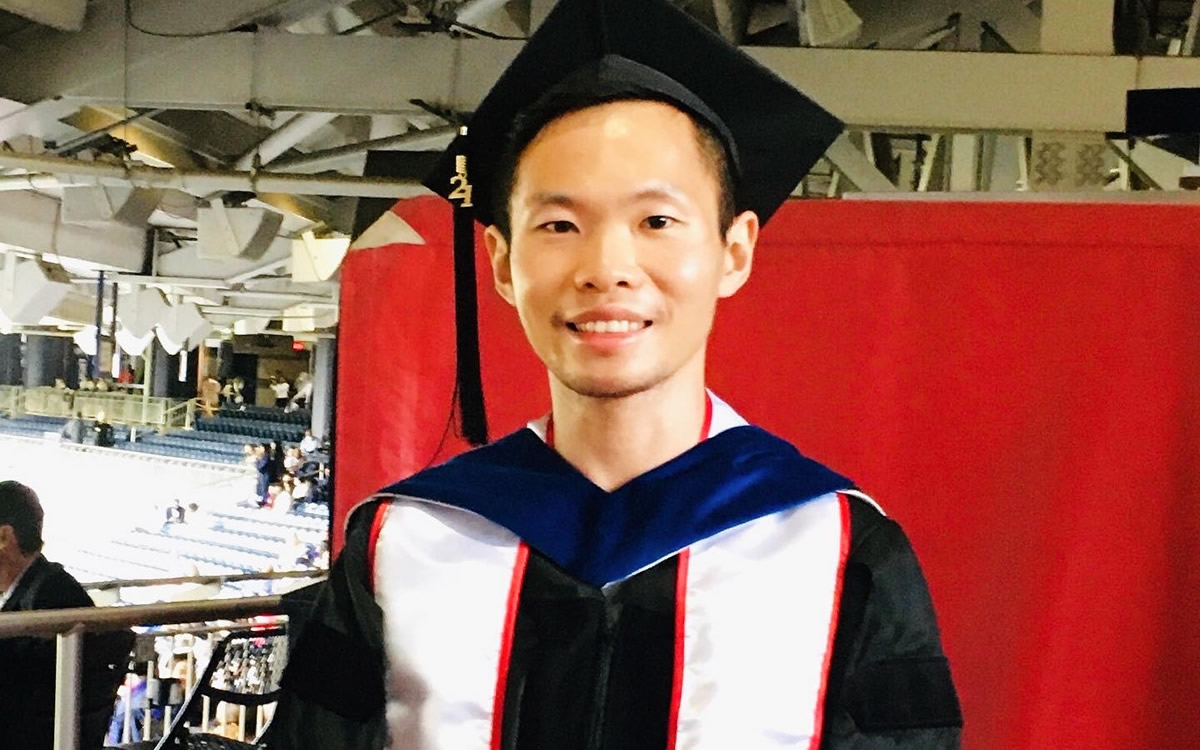
Prosecutors with the U.S. Attorney’s Office have offered to lower two assault charges from a felony to a misdemeanor and to drop a bias-related crime designation for two of three assault charges pending against a D.C. man arrested for the Aug. 7, 2021, hate crime attack against gay Asian man Sean Lai and his parents in Northwest Washington.
According to a document filed on March 4 in D.C. Superior Court, the U.S. Attorney’s Office, which serves as the lead prosecutor in most adult criminal cases in D.C., offered to lower the charges against Patrick Joseph Miller Trebat, 39, in exchange for his agreement to plead guilty to the reduced charges.
Court records show that the U.S. Attorney’s Office and Trebat’s attorney, Brandi Harden, are in “negotiations” presumably over the plea offer, with a felony status hearing scheduled for April 20. D.C. Superior Court Judge Michael O’Keefe, who is presiding over the case, was expected to ask the two parties at the April 20 hearing if an agreement over the plea deal has been reached.
The March 4 document filed in court by the U.S. Attorney’s Office disclosing the plea offer says the offer will expire on April 1, 2022.
Charging documents filed by D.C. police and the U.S. Attorney’s Office at the time of Trebat’s arrest last August state that Trebat allegedly attacked and assaulted Lai, an out gay man of Chinese ancestry, and his parents, who are also from China, while they were walking along the 3700 block of Fulton Street, N.W., near where they live.
The charging documents and a detailed arrest affidavit state that Sean Lai told D.C. police, who arrived on the scene as the incident was unfolding, that during the alleged attack Trebat called him and his parents, “faggots” and shouted, “You are not Americans!” A police report says Trebat also shouted, “Get out of my country.”
According to the police report, the family of three was transported to a local hospital for treatment of injuries listed as non-life threatening shortly after police arrested Trebat on the scene. The report and other charging documents say Trebat allegedly punched, kicked, and pushed all three family members, who at one point fell to the ground, causing various injuries.
Trebat, who lives in a Northwest D.C. apartment located near the scene of the attack, was released pending trial three days after his arrest under the court’s high intensity release program. The program imposed a nighttime curfew on Trebat and a strict order to stay away from the three people he is charged with assaulting.
The current charges pending against him include two counts of felony assault with significant bodily injury and one count of misdemeanor simple assault. Each of the three counts is designated with a bias-related enhancement based on the Asian “national origin” status of the victims.
For reasons it has declined to disclose, the U.S. Attorney’s Office chose not to include a sexual orientation bias-related designation for the assault charges filed against Trebat, even though the arrest affidavit states Trebat shouted the word “faggot” at Lai and his parents.
According to its March 4 plea bargain offer, the U.S. Attorney’s Office, in exchange for a guilty plea by Trebat, will lower the two felony counts of assault with significant bodily injury to misdemeanor counts of simple assault. The offer would retain the existing single count of simple assault.
Under the D.C. Criminal Code, assault with significant bodily harm carries a maximum sentence upon conviction of three years in prison and a possible fine of $12,500. Simple assault carries a maximum sentence of 180 days in prison and a $1,000 fine.
The plea offer for Trebat also calls for withdrawing the bias-related designation for the simple assault counts pertaining to Lai and his mother while leaving just one bias-related count for the alleged assault against Lai’s father.
Under D.C.’s Bias Related Crimes Act, the conviction of a person charged with a crime with a bias-related enhancement allows a judge to increase the penalty, including a fine or jail sentence, by one-and-a-half times greater than the maximum penalty of the underlying crime such as assault.
One other provision in the plea offer gives prosecutors the option of asking the judge to order Trebat held in jail from the time he pleads guilty to the lower charges to the date when he is sentenced, which usually takes place a month or two after the plea is accepted. Another final provision says prosecutors with the U.S. Attorney’s Office are not including in the plea offer a promise to ask the judge to limit the length or severity of the sentence.
Lai couldn’t immediately be reached for comment to obtain his and his parents’ reaction to the plea offer. Harden, Trebat’s attorney, did not respond to a phone message from the Blade asking whether Trebat will agree to the plea offer.
The U.S. Attorney’s Office has a longstanding policy of not publicly disclosing its reasons for offering plea bargain deals to people charged with various crimes. Local attorneys practicing criminal law, including D.C. Attorney Jamison Koehler, have said prosecutors sometimes issue plea bargain offers if they believe there is a chance that a jury will find a defendant they are prosecuting not guilty in a trial.
A plea offer that is accepted by a defendant ensures that the defendant will at least be convicted of an offense, even if the charge is reduced, and eliminates the possibility of a complete acquittal by a jury, according to Koehler and other attorneys familiar with the criminal justice system.
District of Columbia
Imperial Court of Washington drag group has ‘dissolved’
Board president cites declining support since pandemic
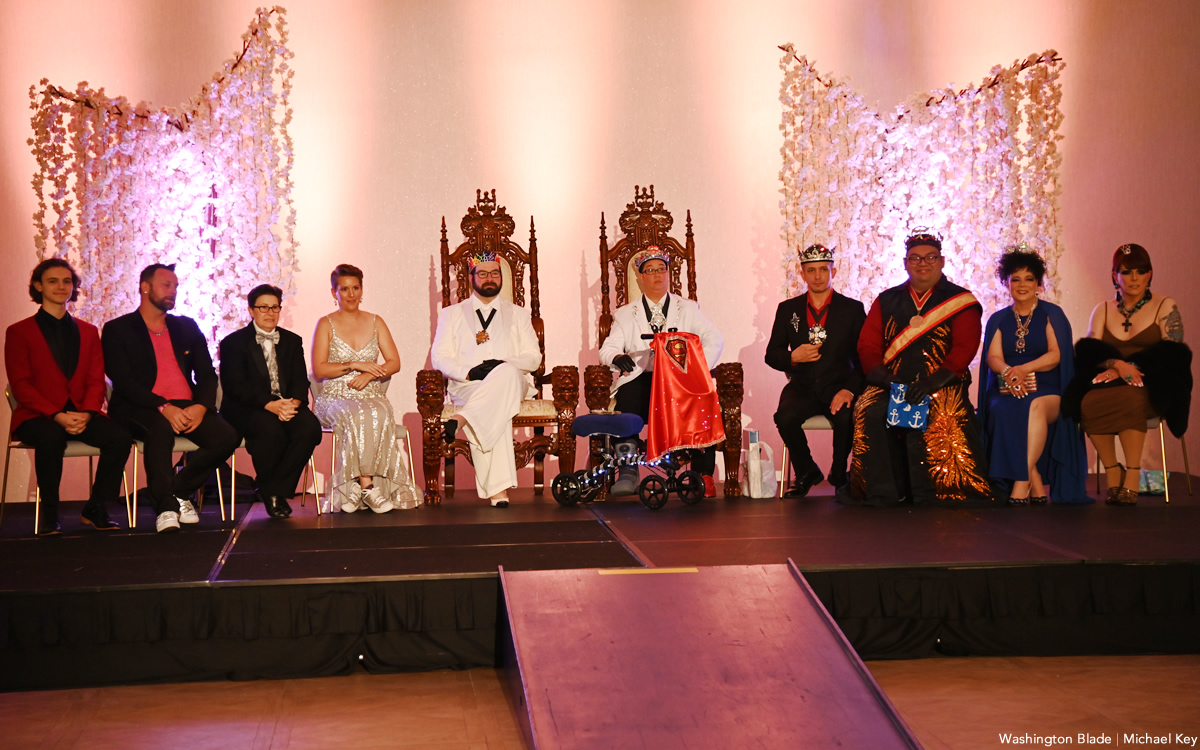
The Imperial Court of Washington, a D.C.-based organization of drag performers that has raised at least $250,000 or more for local LGBTQ and non-LGBTQ charitable groups since its founding in 2010, announced on Jan. 5 that it has ended its operations by dissolving its corporate status.
In a Jan. 5 statement posted on Facebook, Robert Amos, president of the group’s board of directors, said the board voted that day to formally dissolve the organization in accordance with its bylaws.
“This decision was made after careful consideration and was based on several factors, including ongoing challenges in adhering to the bylaws, maintaining compliance with 501(c)(3) requirements, continued lack of member interest and attendance, and a lack of community involvement and support as well,” Amos said in his statement.
He told the Washington Blade in a Jan. 6 telephone interview that the group was no longer in compliance with its bylaws, which require at least six board members, when the number of board members declined to just four. He noted that the lack of compliance with its bylaws also violated the requirements of its IRS status as a nonprofit, tax-exempt 501(c) (3) organization.
According to Amos, the inability to recruit additional board members came at a time when the organization was continuing to encounter a sharp drop in support from the community since the start of the COVID pandemic around 2020 and 2021.
Amos and longtime Imperial Court of Washington member and organizer Richard Legg, who uses the drag name Destiny B. Childs, said in the years since its founding, the group’s drag show fundraising events have often been attended by 150 or more people. They said the events have been held in LGBTQ bars, including Freddie’s Beach Bar in Arlington, as well as in other venues such as theaters and ballrooms.
Among the organizations receiving financial support from Imperial Court of Washington have been SMYAL, PFLAG, Whitman-Walker Health’s Walk to End HIV, Capital Pride Alliance, the DC LGBT Community Center, and the LGBTQ Fallen Heroes Fund. Other groups receiving support included Pets with Disabilities, the Epilepsy Foundation of Washington, and Grandma’s House.
The Imperial Court of Washington’s website, which was still online as of Jan. 6, says the D.C. group has been a proud member of the International Court System, which was founded in San Francisco in 1965 as a drag performance organization that evolved into a charitable fundraising operation with dozens of affiliated “Imperial Court” groups like the one in D.C.
Amos, who uses the drag name Veronica Blake, said he has heard that Imperial Court groups in other cities including Richmond and New York City, have experienced similar drops in support and attendance in the past year or two. He said the D.C. group’s events in the latter part of 2025 attracted 12 or fewer people, a development that has prevented it from sustaining its operations financially.
He said the membership, which helped support it financially through membership dues, has declined in recent years from close to 100 to its current membership of 21.
“There’s a lot of good we have done for the groups we supported, for the charities, and the gay community here,” Amos said. “It is just sad that we’ve had to do this, mainly because of the lack of interest and everything going on in the world and the national scene.”
District of Columbia
Two pioneering gay journalists to speak at Thursday event
Blade’s Chibbaro, Falls Church News-Press’s Benton talk long careers
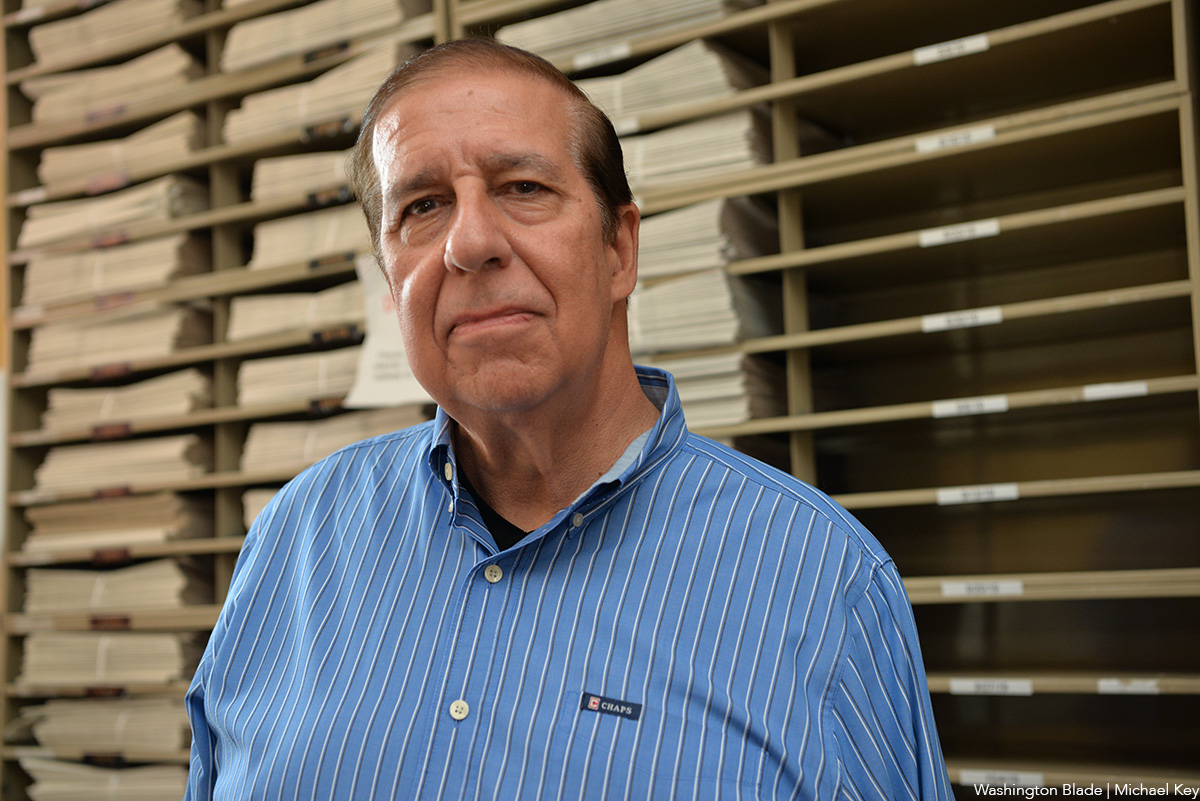
Two local gay journalists will speak on a panel this week about their long, pioneering careers.
A celebration of the Falls Church News-Press’s Nicholas Benton and the Washington Blade’s Lou Chibbaro Jr., two trailblazing LGBTQ journalists who have spent decades reporting on the front lines of social, cultural, legal, and political change in America, will be held this Thursday, Jan. 8, at the Women’s National Democratic Club of Washington. D.C., 1526 New Hampshire Avenue, N.W., at 6 p.m., according to a statement from organizers.
The program will explore their journeys, the evolution of LGBTQ journalism, and the ongoing fight for equality and justice. Benton and Chibbaro will also examine the various factors causing many news outlets to cease print publication and their energetic efforts to continue publishing their work both in print and online.
EVENT DETAILS:
- Remarks and Q&A, in-person and via Zoom.
- 6 p.m. complimentary hors d’oeuvres and cash bar; 6:30–7:30 p.m. program followed by book signing.
- Zoom only: $10. In-person: members: $20, nonmembers: $30 plus tax.
Benton’s latest book, “Please Don’t Eat Your Children, Cult Century, and Other Essays,” will be available for purchase at the event.
Benton is a longtime local journalist and LGBTQ rights activist whose work has had a lasting impact on both community journalism and social justice. Author of the first-ever editorial in the pioneering Gay Sunshine newspaper in 1970, he is best known as the founder, owner, and editor of the Falls Church News-Press, an independent weekly newspaper he launched in 1991 and is the paper of record for the City of Falls Church, Virginia.
Chibbaro is the senior news reporter for the Washington Blade and a pioneering journalist in LGBTQ news coverage. He has reported on the LGBTQ rights movement and community continuously since 1976, first as a freelance writer and later as a staff reporter, joining the Blade in 1984.
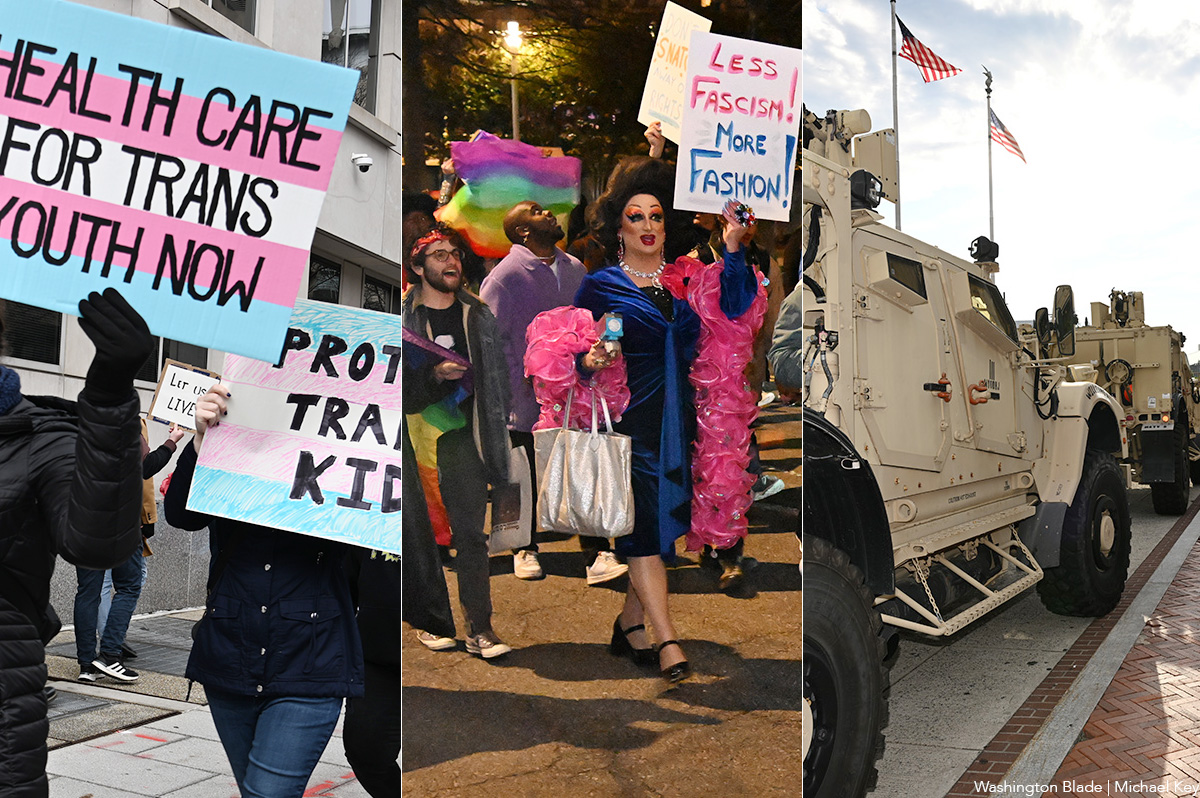
The year 2025 brought unprecedented challenges to D.C. as President Trump initiated a takeover of local police operations and implemented ICE raids in the city. Below are our picks for the top 10 LGBTQ news stories of the year.
10. Man gets 15 years for drug sale that led to deaths of two gay men
A D.C. man was sentenced by a federal judge on June 26, 2025, to 15 years in prison after he pleaded guilty three months earlier to conspiracy related charges that he distributed large amounts of fentanyl and cocaine in the D.C. area, including the sale of fentanyl that resulted in the December 2023 deaths of two D.C. gay men.
A statement released by the Office of the U.S. Attorney for D.C. said Jevaughn Mark, 33, was charged, among other things, with selling fentanyl rather than the requested ketamine, known as “Special K,” to one of the two gay victims who shared the drug with his gay friend. Police identified the men as Brandon Roman, 38, a prominent D.C. attorney and LGBTQ rights advocate, and Robbie Barletta, 28, a home renovation business owner and historic preservationist.
An official with the D.C.-based group HIPS, which provides services to drug users, called the deaths of the two men a poisoning rather than an overdose because they unknowingly consumed the highly toxic fentanyl rather than the ketamine they thought they had.
9. Drag queens, protesters denounce Trump’s Kennedy Center takeover
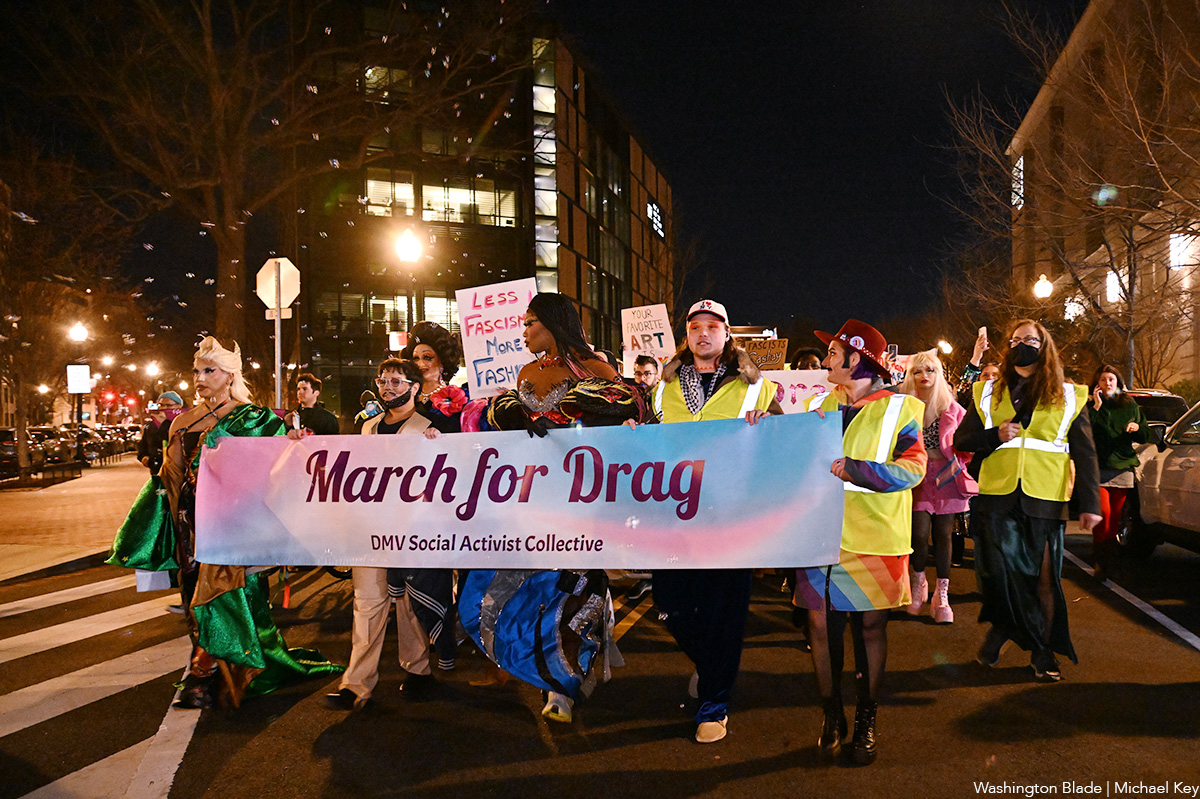
D.C. drag performer Tara Hoot was among other drag queens and about 100 supporters who marched in February from Washington Circle to the Kennedy Center to protest President Donald Trump’s Kennedy Center “takeover” by his appointment of Trump supporters to the performing arts facility’s board of directors.
Hoot and three other local drag performers followed up with their own Kennedy Center protest in June by attending the Kennedy Center’s opening night performance of “Les Misérables” while Trump himself was in attendance. Among the concerns raised by the protesters was the Kennedy Center’s decision in February to cancel a performance by the Gay Men’s Chorus of Washington scheduled for May to celebrate the upcoming WorldPride 2025 DC events. A Kennedy Center spokesperson said the performance was canceled because of “financial” and “scheduling” factors and not by the Trump initiated management changes.
8. D.C. LGBTQ Center celebrates opening of new, larger offices

The D.C. LGBTQ+ Community Center officially opened its new expanded offices on April 26 at 1828 Wiltberger St., N.W., located one block from the Shaw Metro station.
Spanning 6,671 square feet of intentionally designed space, Center Director Kimberley Bush said the new space would offer a wide range of resources for LGBTQ individuals in need – including mental health services, job readiness programs, cultural events and community support groups, all under one roof.
7. Deaths of five key local LGBTQ advocates in 2025
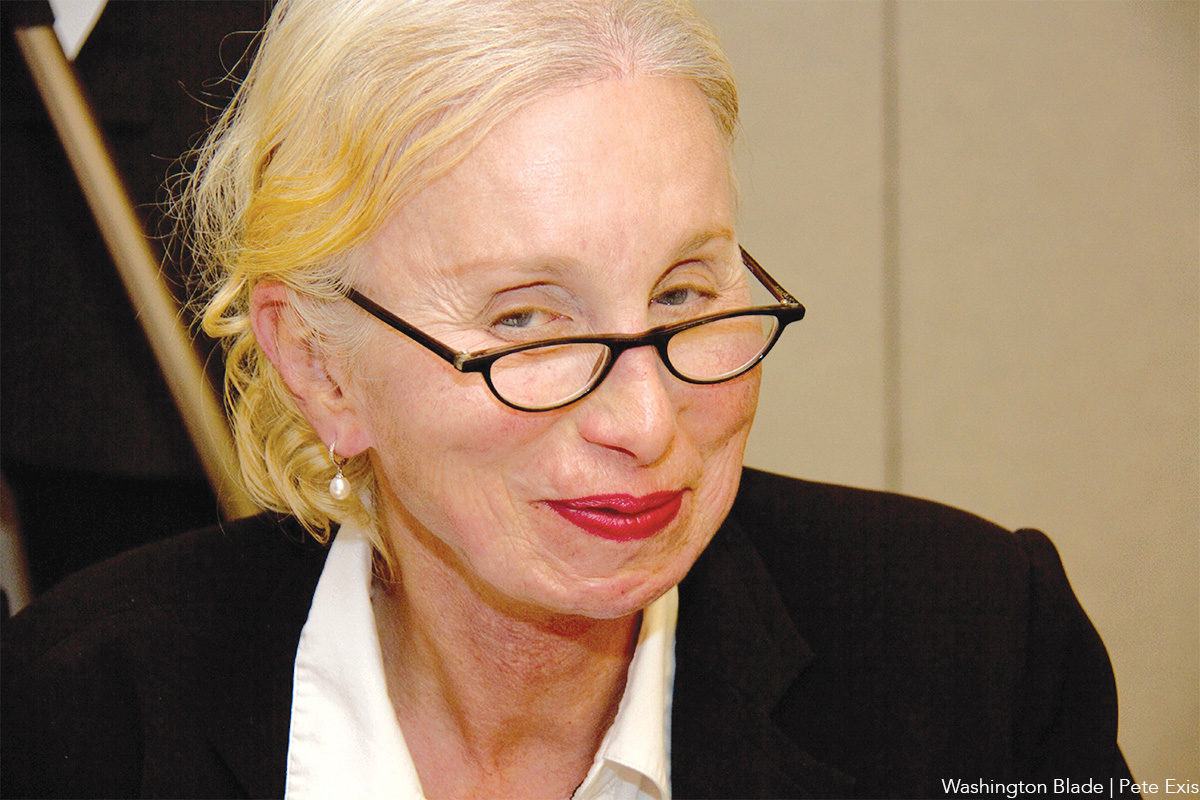
The LGBTQ community took note of the passing of at least five highly regarded local LGBTQ advocates in 2025. Among them were Jeri Hughes, 73, a longtime local transgender rights activist; Dale Sanders, 75, a highly acclaimed D.C. attorney for more than 40 years who played a leading role in providing legal services to people with HIV/AIDS; Patrick Shaw, 60, a highly regarded D.C. public schools teacher; Thomas Mangrum, 61, an acclaimed advocate for people with disabilities and LGBTQ rights activist involved in the city’s Capital Pride events; and Loraine Hutchins, a nationally known and acclaimed advocate for bisexual and LGBTQ rights, and co-author and editor of a groundbreaking book on bisexuality.
6. Pro-LGBTQ Spanberger elected Va. governor
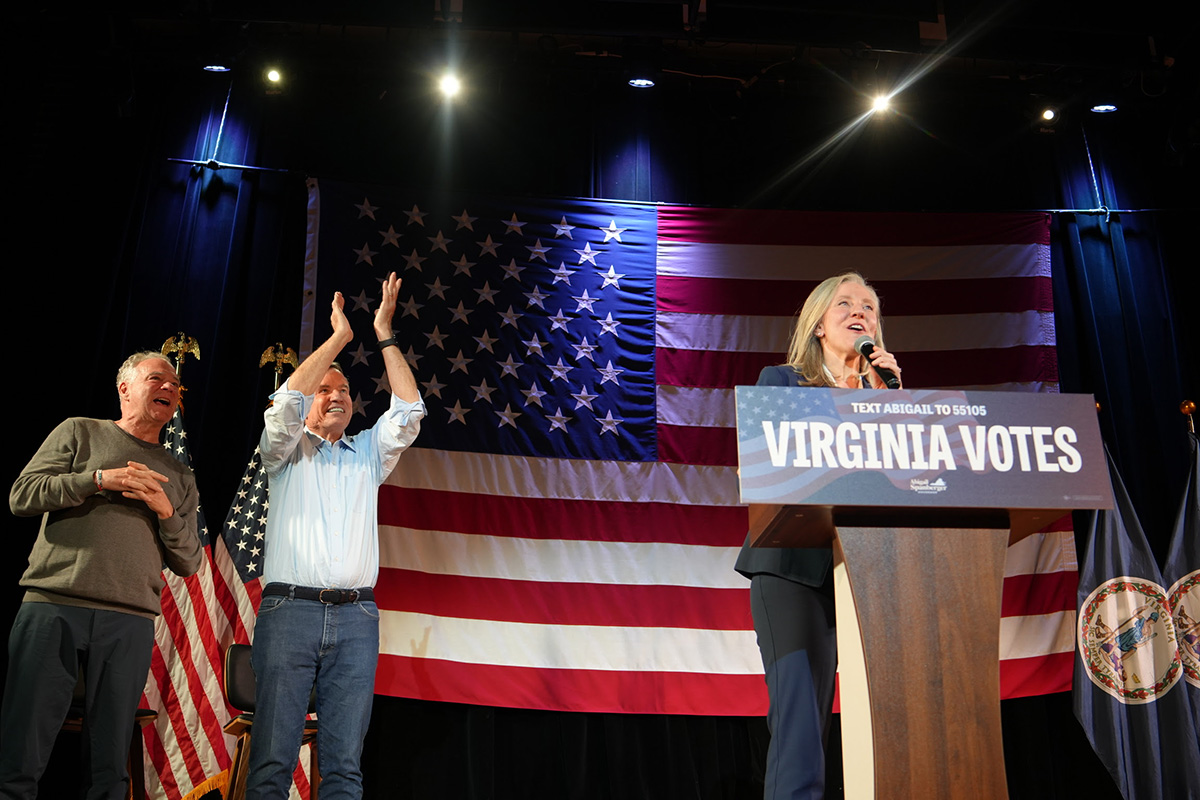
Former congresswoman and longtime LGBTQ rights supporter Abigail Spanberger (D) won her race for governor of Virginia on Nov. 6, defeating the state’s Republican lieutenant governor, Winsome Earle-Sears, who expressed strong opposition to LGBTQ equality. Spanberger, who will succeed incumbent GOP Gov. Glenn Youngkin in January, becomes Virginia’s first female governor.
Meanwhile, John Reid, a gay conservative radio talk show host in Richmond for many years, lost his race as the Republican candidate for lieutenant governor in Virginia, falling short of becoming the state’s first openly gay person to win a statewide office. Reid lost to Democrat Ghazala Hashmi, a member of the Virginia State Senate, who became the first Muslim woman to win election to a statewide office in any state.
5. Trans erasure hits D.C.
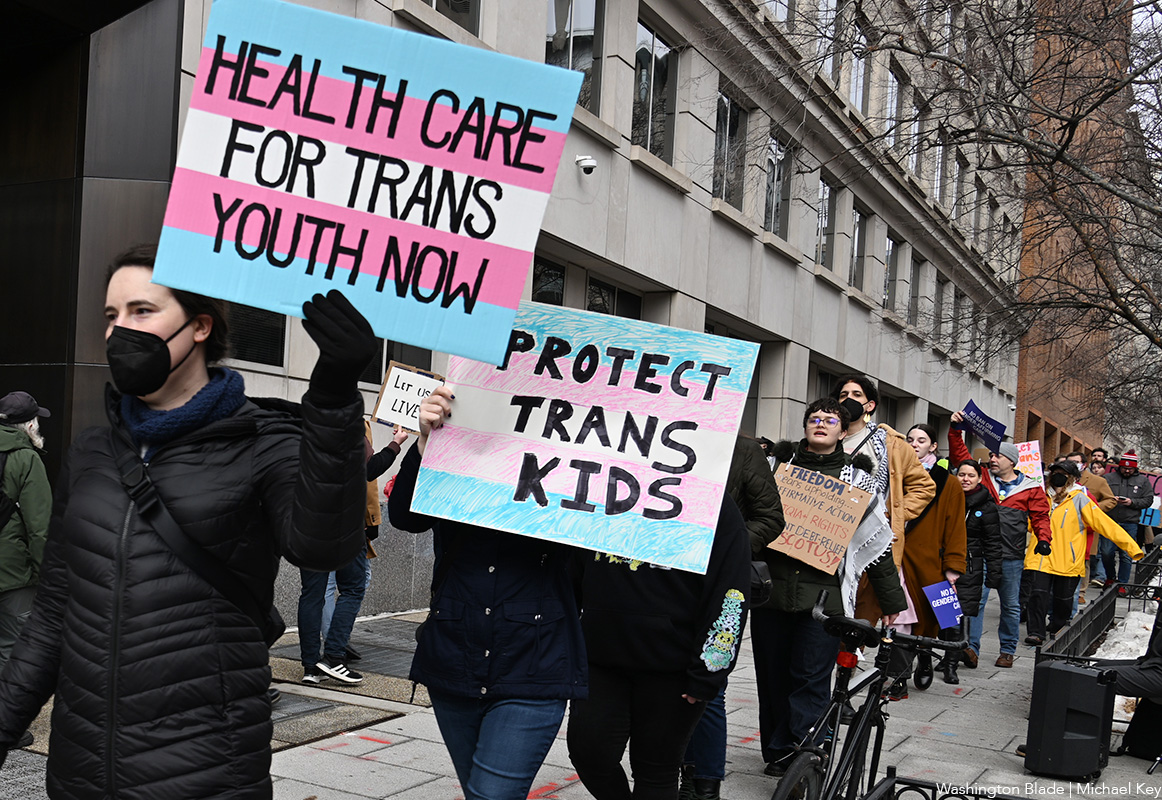
The National Park Service, which owns and maintains Dupont Circle as a federal park, in February removed all references to transgender people from its website devoted to Dupont Circle history. In a development believed to be linked to one of President Trump’s early executive orders banning federal support for trans related issues, the Park Service removed all mention of trans people from its website but left on the site multiple references to the “GLB community.”
In yet another act of what LGBTQ activists are calling “trans erasure,” D.C.’s Children’s National Hospital in July announced it would discontinue beginning Aug. 30 gender transition medical care it has provided for juvenile patients for at least the past 20 years. In a statement posted on its website, the highly acclaimed pediatric hospital said the change was made “in light of escalating legal and regulatory risks to Children’s National.” Most observers interpreted that to mean the risk of federal funding cuts linked to the Trump administration’s animus toward trans supportive programs or policies.
4. D.C. Mayor Bowser announces she will not run for re-election

D.C. Mayor Muriel Bowser, a longtime vocal supporter of the LGBTQ community, announced on Nov. 25 that she will not run for a fourth term. Since first taking office as mayor in January 2015, Bowser has been an outspoken supporter on a wide range of LGBTQ-related issues, including marriage equality and services for LGBTQ youth and seniors.
LGBTQ activists have pointed out that Bowser’s record of support on LGBTQ issues dates back to her tenure as the Ward 4 D.C. Council member from 2007 through January 2015, when she took office as mayor. They also credit her with expanding and significantly increasing funding for the Mayor’s Office of LGBTQ Affairs and appointing the largest number of openly LGBTQ officials to D.C. government jobs than any prior D.C. mayor.
“It has been the honor of my life to be your mayor,” Bowser said in a statement.
3. D.C. LGBTQ bars ‘hanging in there’ amid tough economy

The owners of several of D.C.’s at least 25 LGBTQ bars told the Blade in November they had been negatively impacted by a series of developments and issues impacting most other D.C. bars, restaurants, and nightlife venues. Among the lead issues impacting them, they said, were the deployment by President Trump of National Guard troops on city streets, the nearly two-month-long federal government shutdown that ended in late November, and skyrocketing prices of food and other supplies brought about by the Trump administration’s tariff program.
Other factors cited were a decline in tourist visits to D.C. due to alienation from the Trump administration and a large increase in the number of LGBTQ bars in recent years that some observers said has resulted in fewer people going to each of the LGBTQ bars, the latest one, Rush at 14th and U Street, N.W., having opened in December.
2. At least 1.2 million turn out for WorldPride D.C.

At least 1.2 million people turned out from throughout the U.S. and internationally for WorldPride D.C. 2025, which took place from mid-May through June. It included hundreds of events held across the city. Among them were an international human rights conference, a March on Washington for LGBTQ Equality, sporting events with LGBTQ athletes, concerts by LGBTQ choral groups and nationally acclaimed pop musicians.
The events culminated with a six-hour-long WorldPride Parade on June 7 that drew hundreds of thousands of participants and bystanders and included a 1,000-foot long rainbow flag that led the parade. The WorldPride street festival and concert took place that same day and the following day, on June 8, along Pennsylvania Ave, N.W. that included hundreds of booths.
The 1.2 million attendance and the a $310 million economic impact it had on the city were significantly less that what had been initially predicted by city officials, who, along with LGBTQ activists, said the lower attendance and economic impact was due in part to the anti-LGBTQ policies and alienation of many potential foreign visitors by the Trump administration.
1. Trump takes control of D.C. police, deploys National Guard

LGBTQ rights advocates joined community leaders across the city in condemning President Donald Trump’s decision in August to take control of the D.C Metropolitan Police Department and deploy 800 National Guard troops to address what he called a crime wave caused by “bloodthirsty criminals” and “roving mobs of wild youth.”
A coalition of local LGBTQ advocacy organizations joined other community leaders, including gay D.C. Council member Zachary Parker (D-Ward 5), in calling Trump’s action a “power grab” aimed at eliminating D.C.’s locally elected government that would adversely impact people of color, the LGBTQ and immigrant communities.
In a development that captured national attention, a gay man was arrested on Aug. 10 on a misdemeanor assault charge for tossing a hero sandwich into the chest of a uniformed U.S. Customs and Border Control agent on a street near several gay bars in what he called an act of protest and defiance of the Trump deployment of federal troops and agents in D.C. In what some observers called a gesture of support for gay sandwich thrower Sean Charles Dunn, a federal court jury handed down a verdict of not guilty for the assault charge.

















